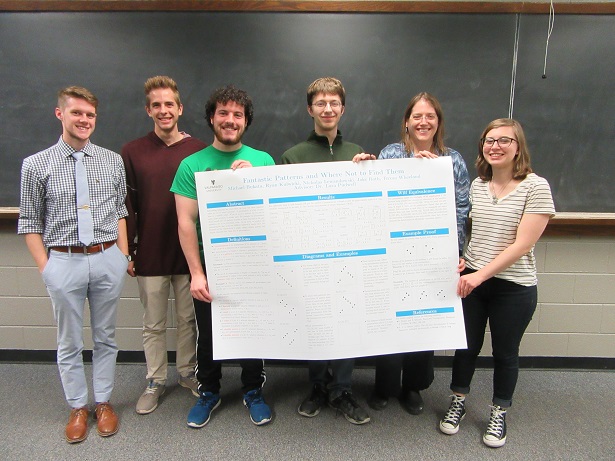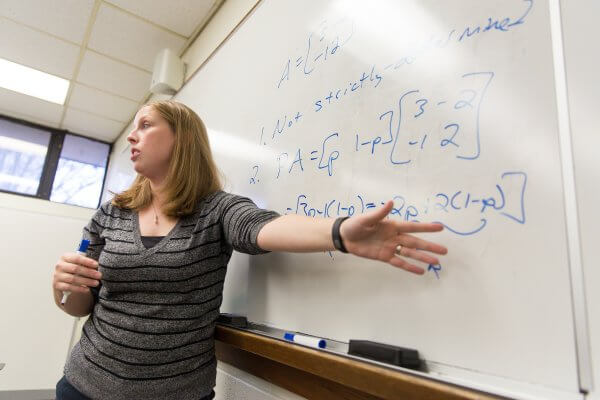Thinking Outside the Box
Whether through academic-year research projects, departmental honors projects, or the summer VERUM program, Valpo offers may opportunities to participate in mathematics research as a student. Mathematics majors Michael Bukata ’20, Ryan Kulwicki ’19, Nicky Lewandowski ’20, Jacob Roth ’20, and Teresa Wheeland ’20 collaborated on a research project throughout the 2017-2018 academic year. Nicky, Jacob, and Teresa continued work over summer 2018. A year later, they reflected on what they learned from research compared to their previous mathematics experiences.

Nicky writes, “When doing math research, the brain needs to work differently than when taking a math course. There is no particular right (path to an) answer. During a math class, a student can go to their professor and say, ‘I have this proof started, but I’m not sure where to go next’ and by the end of office hours, the proof is completed. When doing research, the student might come to the professor with the start of a proof only to find that the professor gives three or four possible directions to try in order to finish the proof. While there are timelines in research, the timelines are a lot more spread out than a weekly math assignment. You may get stuck when doing research. Over the summer, there was a time period where I got stuck on the research aspect of my project, I started focusing on writing up my results. I still worked on the math, but I gave myself a break to refocus in order to keep going with my research”
Working on a problem when you’re unsure of how to solve it at first may sound daunting, but Jacob relates that the challenge is worth it: “There something so satisfying and rewarding about solving problems in a research setting. When I do homework problems, I always have some sort of idea regarding what tools I should be using to find an answer. In research, there is not always that sense of direction. The results you come up with are novel; no one has ever done it before. Once you find a pattern and prove why it works, you have proven something that all mathematicians can use forever.”
Ryan also highlights the difference between full-time summer work and part-time academic-year research. He says, “During my Junior year at Valpo as a math and computer science double major, I participated in pure math research. The summer prior, I had participated in an REU (research experience for undergraduates) at Cleveland State University. The difference between this summer experience and my year-long math experience at Valpo was that the REU was heavily computer focused. It was a very different change of pace, as my Valpo research allowed me to collaborate much more closely with the rest of my research team while still studying other classes. Taking the time to digest the new math that was being exposed to me helped with developing my own new ideas about how to approach these never-before-answered questions. I thoroughly enjoyed unleashing a new sense of self-motivation from the experience, as well as meeting new friends in the process.”
Contrary to the stereotype of math being an individual activity mostly consisting of computations, Nicky adds, “Most importantly, I learned that math is a collaborative. When we grow up doing math, students often find that they have to do math on their own. However, when doing research, math becomes a collaborative field where mathematicians are constantly pitching ideas to each other in hopes that together they can reach their goal. I found that math does not have to just be done in a classroom. Over the summer, the research team and I would frequently move to off campus locations to work on our research individually. While we had our separate parts of the project we were working on, it helped me to do math near my colleagues so I could ask for their input quickly.”
Research can lead to other professional opportunities. All five team members co-presented their project at Valpo’s annual Symposium on Undergraduate Research and Creative Expression where they shared their work with faculty and students from across campus. Over the summer, Nicky, Jacob, and Teresa presented their work on campus again. Jacob also elected to travel with Professor Pudwell (the faculty member leading the project) to the International Conference on Permutation Patterns at Dartmouth College where he presented a poster on the team’s work to researchers from around the world. His reflections from the conference can be found here: Snapchat Stories: Research Conference at Dartmouth College
Although publication isn’t guaranteed in research, this team’s project was eventually published in the Journal of Integer Sequences in spring 2019. You can find the final article here: Distributions of Statistics over Pattern-Avoiding Permutations
The five students involved in this project have a variety of post-graduation plans ranging from high school teaching to graduate school to directly joining the work force. Considering their variety of long-term goals, did they all see a benefit to making time for research on top of their classwork?
Nicky says, “I would definitely recommend a research experience to anyone who is interested. Research experiences are abundant in college and it is worth taking advantage of. Look for a project topic that interests you and talk to the professor about what the project entails!”
Ryan adds, “I would always recommend doing math research to those even remotely interested because it gives an experience that you cannot get in a classroom. It feels more like a real-world job, where there aren’t set answers from a textbook. You are writing the answers! Also, it is not as big of a time commitment as you may think. A few hours a week will more than likely suffice, but it is important to remember that you get out what you put into it. Math research with Professor Pudwell is one of the shining highlights in my 4 years at Valpo.”
